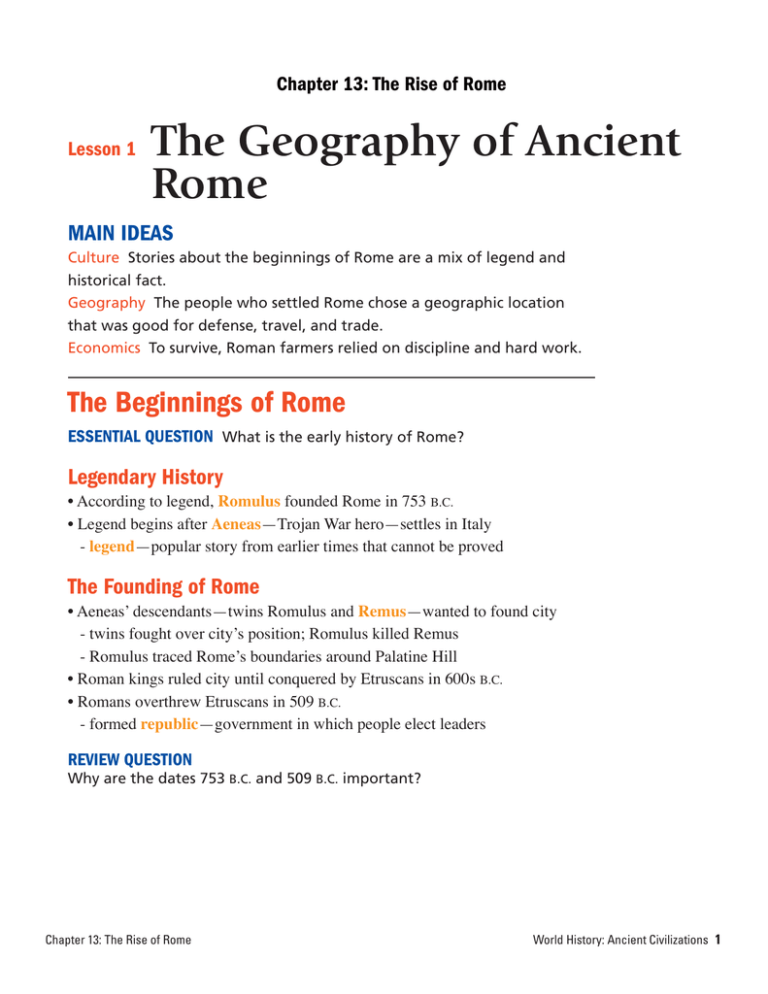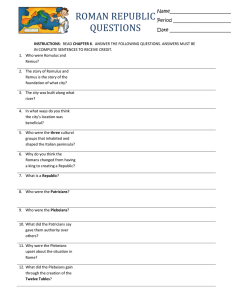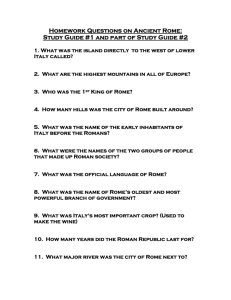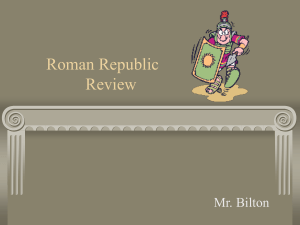The Rise of Rome Lesson 1 The Geography of Ancient Rome MAIN
advertisement

Chapter 13: The Rise of Rome Lesson 1 The Geography of Ancient Rome MAIN IDEAS Culture Stories about the beginnings of Rome are a mix of legend and historical fact. Geography The people who settled Rome chose a geographic location that was good for defense, travel, and trade. Economics To survive, Roman farmers relied on discipline and hard work. The Beginnings of Rome ESSENTIAL QUESTION What is the early history of Rome? Legendary History • According to legend, Romulus founded Rome in 753 B.C. • Legend begins after Aeneas—Trojan War hero—settles in Italy - legend—popular story from earlier times that cannot be proved The Founding of Rome • Aeneasʼ descendants—twins Romulus and Remus—wanted to found city - twins fought over cityʼs position; Romulus killed Remus - Romulus traced Romeʼs boundaries around Palatine Hill • Roman kings ruled city until conquered by Etruscans in 600s B.C. • Romans overthrew Etruscans in 509 B.C. - formed republic—government in which people elect leaders REVIEW QUESTION Why are the dates 753 B.C. and 509 B.C. important? Chapter 13: The Rise of Rome World History: Ancient Civilizations 1 Rome’s Geographic Location ESSENTIAL QUESTION Why was Rome’s location so favorable? Hills and River • In reality, Rome was settled by Latins - spot had mild climate, good farmland, strategic location • Built city on seven hills that could be defended - farmed at base of the hills; lived on hilltops • City was close to Mediterranean Sea and its trade routes - lay next to Tiber River, which aided trade and provided protection Italian Peninsula • Romeʼs location on Italian Peninsula helped its development - peninsula—land surrounded on three sides by water • Roman ships could sail to other lands surrounding Mediterranean - helped in conquering new territories, developing trade routes • Alps, Apennines mountains protected Rome, but didnʼt isolate it • Italyʼs large plains made farming easier than in Greece REVIEW QUESTION How did its geography help Rome grow? Chapter 13: The Rise of Rome World History: Ancient Civilizations 2 Lives of Early Romans ESSENTIAL QUESTION What was life like for the early Romans? Working the Land • Early Roman farmers had small plots of land for wheat, barley - also grew beans, vegetables, fruit; later, grapes and olives - worked with oxen and raised pigs, sheep, goats, chickens • Landowning farmers served in army • Some farmers grew rich, built estates - gap was created between rich estate owners and small farmers Farm Life • Early farmers lived in mud or timber homes with little furniture • Lived in extended families • Farmed with simple tools, produced enough food to feed family • Hard work, discipline, and loyalty became strong Roman qualities - these qualities helped Roman army conquer Italy REVIEW QUESTION Why was discipline important to early Romans? Lesson Summary • Legend and fact shaped Romeʼs early history. • Romeʼs geography encouraged the growth of Roman civilization. • Roman society benefited from the hard work and discipline of Roman farmers. Why It Matters Now . . . There are still many cultural connections among Mediterranean areas of Europe, Asia, and Africa as a result of Romeʼs influence. Chapter 13: The Rise of Rome World History: Ancient Civilizations 3




